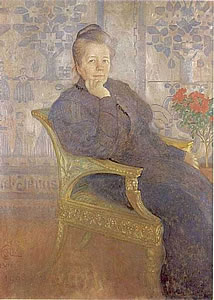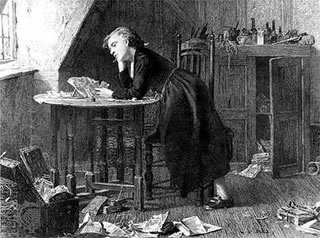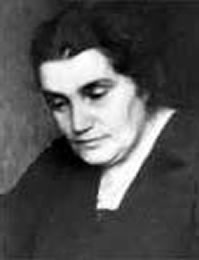De Amerikaanse schrijver Don DeLillo werd op 20 november 1936 geboren in New York City als zoon van Italiaanse immigranten. Zie ook alle tags voor Don DeLillo op dit blog.
Uit: Zero K
“Everybody wants to own the end of the world. This is what my father said, standing by the contoured windows in his New York office—private wealth management, dynasty trusts, emerging markets. We were sharing a rare point in time, contemplative, and the moment was made com-plete by his vintage sunglasses, bringing the night indoors. I studied the art in the room, variously abstract, and began to understand that the extended silence following his remark belonged to neither one of us. I thought of his wife, the sec-ond, the archaeologist, the one whose mind and failing body would soon begin to drift, on schedule, into the void.
That moment came back to me some months later and half a world away. I sat belted into the rear seat of an armored hatchback with smoked side windows, blind both ways. The driver, partitioned, wore a soccer jersey and sweatpants with a bulge at the hip indicating a sidearm. After an hour’s ride over rough roads he brought the car to a stop and said some-thing into his lapel device. Then he eased his head forty-five degrees in the direction of the right rear passenger seat. I took this to mean that it was time for me to unstrap myself and get out. The ride was the last stage in a marathon journey and I walked away from the vehicle and stood a while, stunned by the heat, holding my overnight bag and feeling my body unwind. I heard the engine start up and turned to watch. The car was headed back to the private airstrip and it was the only thing moving out there, soon to be enveloped in land or sinking light or sheer horizon. I completed my turn, a long slow scan of salt flats and stone rubble, empty except for several low structures, pos-sibly interconnected, barely separable from the bleached landscape. There was nothing else, nowhere else. I hadn’t known the precise nature of my destination, only its remote-ness. It was not hard to imagine that my father at his office window had conjured his remark from this same stark ter-rain and the geometric slabs that blended into it. He was here now, they both were, father and stepmother, and I’d come to pay the briefest of visits and say an uncer-tain farewell. The number of structures was hard to determine from my near vantage. Two, four, seven, nine. Or only one, a central unit with rayed attachments. I imagined it as a city to be discovered at a future time, self-contained, well-preserved, nameless, abandoned by some unknown migratory culture. The heat made me think I was shrinking but I wanted to remain a moment and look. These were buildings in hiding, agoraphobically scaled.”
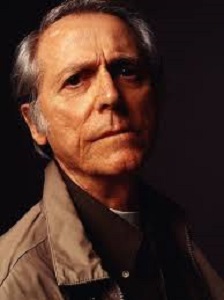
Don DeLillo (New York City, 20 november 1936)
De Duitse schrijfster Theresia Walser werd geboren op 20 november 1967 in Friedrichshafen. Zie ook alle tags voor Theresia Walser op dit blog.
Uit: A Playwright’s Worries (Vertaald door Claudia Wilsch Case)
“Often when I am working on a new play, my characters suddenly start acting more erratically than I had planned. They upset my designs; they thwart my intentions and ideas. This moment is a struggle, but always a fortunate one, because it signals the adventure of a play that is yet to be written. Once it is finished, the process starts again: I have created something that can only reveal itself in practice. Until it is staged, a play remains unformed; the same is true of the playwright. Sometimes I even think that each performance is actually an attack on the playwright, and that I have no other choice but to answer with another play.
When I give a play to a director, I tremble as I think of what is to come. On the one hand, it is a relief to know that from that point on, someone else’s imagination will propel the play, discovering things that I did not even know were there. On the other, I am anxious that a director might suddenly discover too much, might burden the characters with other people’s social tragedies, or impose deep meaning on an otherwise lighthearted play.
Novels are protected by the covers of a book, but plays are offered no such security. It has been said that each reader stages his own version of a novel. However, we don’t mean that a reader clips different passages from the book and pastes the end at the beginning, or that he cuts characters or entire subplots that he thinks will only distract him from what is essential, or that he suddenly inserts a topical newspaper article in the middle. A reader also doesn’t cover the margins of a book with the titles of musical numbers that he feels an urgent need to listen to while reading. And even if such a reader existed, he wouldn’t think to pester other readers with his private enjoyment.
A director is first and foremost a reader, the most influential reader a playwright has. All plays need a director who is sensitive to language, especially plays that don’t rely on a solidly constructed plot but instead use language to convey the action, plays where the characters are defined by the music of their language, plays where form and content cannot be separated, and plays where language itself determines the content. I don’t mean that plays should be celebrated obediently, or that directors should drown them in the kinds of musical sauces that have become popular recently, all the while believing they are taking the language particularly seriously. Both of these extremes signal an unwillingness by directors to confront language as an event onstage.”
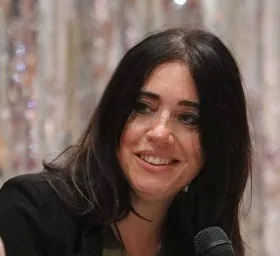
De Russische schrijfster en scenariste Viktoria Tokareva werd geboren op 20 november 1937 in Leningrad (Sint Petersburg). Zie ook alle tags voor Viktoria Tokareva op dit blog.
Uit: Auch Miststücke können einem leidtun (Vertaald door Angelika Schneider)
„Bakowka ist ein Dorf, das an unsere Datschen-siedlung angrenzt. Ein richtiges Dorf mit Holzhäusern, aus Balken, die im Laufe der Zeit dunkel geworden sind. Das Dorf hat geschnitzte Fensterläden, Palisadenzäune, Vorgärten, ein ma-lerisches Flüsschen, Gänse, ausspuckende Männer und herumschreiende Frauen. Nach der Perestroika begann man, diese herum-schreienden Frauen >Farmerinnen< zu nennen. Sie brachten ihre selbstangebauten und -hergestellten Lebensmittel zu unserer Siedlung: Milch, Quark, Eier, Gemüse. Ich hatte schnell herausgefunden, bei wem man etwas kaufen konnte und bei wem nicht. Alles hängt vom >menschlichen Faktor< ab. Die sehnige Olga kaufte den Quark in der ganzen Gegend auf, er wurde bei ihr sauer, dann legte sie zweihundert Gramm frischen Quark obenauf und trug ihn aus. Die Leute probierten von oben — man wühlt ja nicht mit dem Finger bis in die Tiefe — und kauften voller Begeisterung die ganze Portion. In der Kü-che kippten sie den Quark in eine Schüssel. Dann kam das, was unten war, nach oben, stinkend und gesundheitsschädlich. Was kann man da sagen? Die kurzsichtige Olga kannte die Gesetze des Marktes nicht. Ein zweites Mal kaufte natürlich niemand mehr bei ihr. Und selbst wenn sie nun gute Sahne brachte und frische Eier, so jagte man sie doch mit deutlichen Worten von der Schwelle. Olga hatte so etwas wie Wett-bewerb nicht in ihre Rechnung mit einbezogen. Sie handelte nach dem Gesetz der Zieselmaus: raf-fen und ab in die Höhle. In der Datschensiedlung wohnten zwar Leute aus der Intelligenzija, doch Dummköpfe waren sie deshalb noch lange nicht. Man konnte sie einmal anschmieren, aber öfter auch nicht. Dann kam die dicke Irka, die polternd einen eisernen Karren hinter sich herzog. In diesem Kar-ren lagen alle Gemüse der Saison. Ihre Ware war nicht schlecht, doch ihre Preise hatten eine Null zu viel. Wenn ein Kilo Kartoffeln auf dem Markt zehn Rubel kostete, dann kostete es bei Irka hundert. »Na, nimm doch gleich tausend«, schlug ich vor. Irka sah mir misstrauisch ins Gesicht. »Na und?«, sagte ich weiter in naivem Ton. »Wenn einer Geld hat, was für einen Unterschied macht es da schon, wie viel er zahlt: ob hundert oder tausend?“
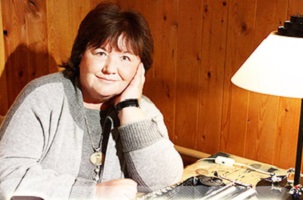
Viktoria Tokareva (Leningrad, 20 november 1937)
De Iraanse dichteres, vertaalster en mensenrechten-advocate Sheema Kalbasi werd geboren op 20 november 1972 in Teheran. Zie ook alle tags voor Sheema Kalbasi op dit blog
God speaks Hebrew (Fragment)
God is my father,
With his big brown lovely eyes,
The strict laws of my mother,
To grow up good, nice and humble!
Demanding school grades with only straight A’s!
God swims like a rolling fish,
Diverse of dolphins
Yesterday,
He sneezed within me,
God and his kissable mouth,
Smiling with a wide-open heart!
God never cheats,
Never rapes,
Never hates
Sings in Hindi,
Persian and Russian,
Latin, Swahili and Sindi!
Can be understood in Semitic languages,
Arabic and Hebrew!
God walks in kimonos,
Sophisticated and elegant
Smells like iris and talks like English
He is a little Chinese village-man,
Rejecting the ism
He reborn the angels,
As they sing the symphony of cotton fields,
A freedom’s journey,
An escape from unformed yellow seeds
Crystal hands, crystal stars,
Crystal green gardens,
And my crystal laughter,
Essentializes the whole poem of life.
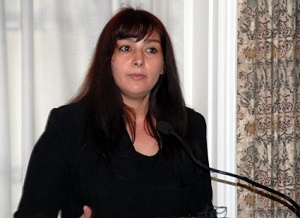
Sheema Kalbasi (Teheran, 20 november 1972)
De Zuidafrikaanse schrijfster Nadine Gordimer werd geboren op 20 november 1923 in Springs. Zie ook alle tags voor Nadine Gordimer op dit blog.
Uit:The House Gun
“They are watching it on the screen with their after-dinner coffee cups beside them. It is Bosnia or Somalia or the earthquake shaking a Japanese island between apocalytic teeth like a dog; whatever were the disasters of that time. When the intercom buzzes each looks to the other with a friendly reluctance; you go, your turn. It’s part of the covenant of living together. They made the decision to give up the house and move into this townhouse complex with grounds maintained and security-monitored entrance only recently and they are not yet accustomed, or rather are inclined momentarily to forget that it’s not the barking of Robbie and the old-fangled ring of the front door bell that summons them, now. No pets allowed in the complex, but luckily there was the solution that theirs could go to their son who has a garden cottage.
He, she–twitch of a smile, he got himself up with langhuor directed at her and went to lift the nearest receiver. Who, she half-heard him say, half-listening to the commentary following the images, Who. It could be someone wanting to convert to some religious sect, or the delivery of a summons for a parking offence, casual workers did this, moon-lighting. He said something else she didn’t catch but she heard the purr of the electronic release button.
What he said then was, Do you know who a Julian-somebody might be? Friend of Duncan?
He, she–they didn’t, either of them. Nothing unusual about that, Duncan, twenty-seven years old, had his own circle just as his parents had theirs, and these intersected only occasionally where interests, inculcated in him as a child by his parents, met.
What does he want?
Just said to speak to us.
Both at the same instant were touched by a live voltage of alarm. What is there to fear, defined in the known context of a twenty-seven-year-old in this city–a car crash, a street mugging, a violent break-in at the cottage. Both stood at the door, confronting these, confronting the footsteps they heard approaching their private paved path beneath the crossed swords of Strelitzia leaves, the signal of the second buzzer, and this young man, come from? for? Duncan. He stared at the floor as he came in, so they couldn’t read him. He sat down without a word.”
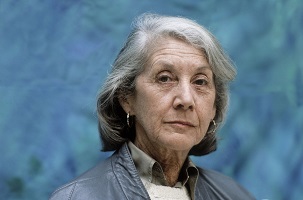
Nadine Gordimer (20 november 1923 – 13 juli 2014)
De Engelse dichter en schrijver Thomas Chatterton werd geboren op 20 november 1752 in Bristol als zoon van een koster. Zie ook alle tags voor Thomas Chatterton op dit blog.
The Advice (Fragment)
Tho’ rapture wantons in your air,
Tho’ beyond simile you’re fair,
Free, affable, serene;
Yet still one attribute divine
Should in your composition shine–
Sincerity, I mean.
Tho’ num’rous swains before you fall,
‘Tis empty admiration all,
‘Tis all that you require;
How momentary are their chains!
Like you, how unsincere the strains
Of those who but admire!
Accept, for once, advice from me,
And let the eye of censure see
Maria can be true;
No more for fools or empty beaux,
Heav’n’s representatives disclose,
Or butterflies pursue.
Fly to your worthiest lover’s arms,
To him resign your swelling charms,
And meet his gen’rous breast;
Or if Pitholeon suits your taste,
His muse with tattr’d fragments graced,
Shall read your cares to rest.
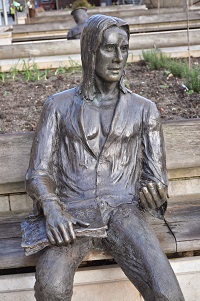
Thomas Chatterton (20 november 1752 – 5 augustus 1770)
Standbeeld in Bristol
De Russische dichteres en schrijfster Zinaida Nikolaevna Hippius werd als kind van uit Duitse familie geboren op 20 november in Beljov bij Tula. Zie ook alle tags voor Zinaida Hippius op dit blog.
Our Love Is One
A wave boils with its foam, freezing,
And dissipates – just only once,
A heart could not to live with treason.
No treason! Love is one for us!
We may be angry, may be reasoned,
Or false – but heart did not decline
To black adultery, to treason:
Our soul is one – our love is one.
In its monotony and emptiness,
All life could usually be gone…
And in this life as long as endless,
Our love is one, yes, always one.
Helplessness
I look at a sea – the greedy one and fervent,
Chained to the earth, on the depleted shore…
Stand by a gulf – over the endless heavens,
And could not fly to azure, as before.
I didn’t decide to join or slaves, or rebels,
Have no a courage nor to live, nor – die…
I feel my God – but cannot say my prayers,
I want my love – but can’t find love of mine.
I send to sun my worship and my groan,
I see a sheet of clouds, pale and cold…
What is a truth? It seems to me, I know, –
But for the truth I have not the right world.
Vertaald door Yevgeny Bonver
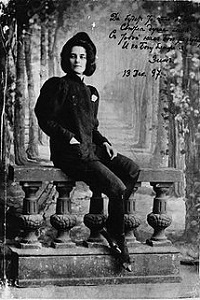
Zinaida Hippius (20 november 1869 – 9 september 1945)
De Zweedse schrijfster Selma Lagerlöf werd geboren op 20 november 1858 in Östra Emterwik in Zweden. Zie ook alle tags voor Selma Lagerlöf op dit blog.
Uit: Niels Holgersson’s wonderbare reis (Vertaald door Margaretha Meijboom)
“Hij las een paar regels, maar toen keek hij toevallig op.
Daardoor viel zijn oog op den spiegel, en toen riep hij hardop: ‘Kijk, daar is er nog een!’
Want in den spiegel zag hij duidelijk een klein, klein kaboutertje, gekleed met een slaapmutsje en een leeren broek aan. ‘Die is precies gekleed als ik,’ zei de jongen, en sloeg de handen in elkaar van verbazing. Maar toen zag hij, dat de kabouter in den spiegel hetzelfde deed.
Toen begon hij zich aan de haren te trekken en zich in de armen te knijpen en rond te draaien, en oogenblikkelijk deed hij daar in den spiegel het hem na.
De jongen sprong een paar keer rond, om te zien of er een of ander klein kereltje achter hem stond. Maar hij vond niemand – en toen begon hij van schrik te beven. Want nu begreep hij, dat de kabouter hem betooverd had, en dat de kabouter, dien hij daar in den spiegel zag, niemand anders was dan hijzelf.
***
De jongen kon maar niet gelooven, dat hij in een kabouter veranderd was.
‘’t Is zeker maar een droom – of verbeelding,’ dacht hij. ‘Als ik even wacht, word ik wel weer een mensch.’
Hij ging voor den spiegel staan, en sloot de oogen. Hij opende ze eerst na een paar minuten, en verwachtte toen, dat het weer over zou zijn. Maar dat was niet zoo: hij was en bleef even klein. Overigens was hij precies, zooals hij geweest was. Het lichte vlashaar en de zomersproeten op neus en lippen, de lappen op zijn leeren broek en de stoppen in zijn kousen, alles was precies eender; alleen was alles kleiner geworden.
Neen, stil te staan en te wachten tot het overging, dat diende nergens voor; dat merkte hij wel. Hij moest wat anders probeeren. En het verstandigste wat hij doen kon, was, meende hij, den kabouter op te zoeken en zich met hem te verzoenen.”
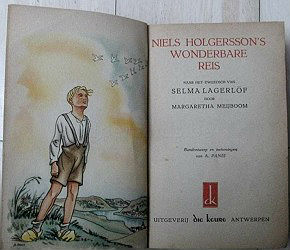
Selma Lagerlöf (20 november 1858 – 16 maart 1940)
Geïllustreerde uitgave
De Russische schrijfster Yevgenia Ginzburg werd geboren op 20 november 1904 in Moskou. Zie ook alle tags voor Yevgenia Ginzburg op dit blog.
Uit: Marschroute eines Lebens
»Jetzt blicken wir uns in die Augen. Vor uns ziehen die gleichen Bilder aus der Vergangenheit vorüber.. . Vor zehn Jahren.. . Ich, eine blutjunge Anfängerin, gebe ihm, einem Analphabeten, einem Bürschchen, das gerade aus seinem tatarischen Dorf in die Stadt gekommen ist, Unterricht. Dieses Bürschchen ist heute Sekretär des Bezirkskomitees~.~
(…)
»Wieviel einfacher und leichter wäre für mich alles gewesen, wenn es die Gestapo gewesen wäre! Ich wußte ganz genau, wie sich ein Kommunist zu benehmen hatte, der ihr in die Hände fiel. Aber hier? Hier mußte man – ~ -~ sich erst einmal klarmachen, wer die Menschen waren, die. einen gefangen hielten. Waren es verkleidete Faschisten: oder waren es Opfer eines ungeheuren Betrugs, einer raffinierten Intrige? Und wie hatte sich ein Kommunist in seinem eigenen Gefängnis zu verhalten.. .?
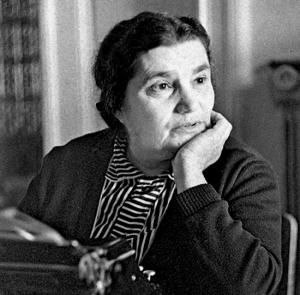
Onafhankelijk van geboortedata
De Nederlandse dichter en schrijver Jordi Lammers werd geboren in 1996 in Venray. Zie ook alle tags voor Jordi Lammers op dit blog.
hoe noemen we dit lichaam
we gooiden onze namen in het dal en hoopten
dat het dal iets mooiers terug zou gooien
maar er kwam niets
we stopten bij een bergmeer, keken
elkaar oog in oog uit elkaars kleren
hingen onze spullen aan een tak en lieten
ons langzaam in het water zakken
je dreef op je rug alsof het water het gewicht uit je lichaam had gezogen
pas toen ik mijn vinger
aan een rotspunt opensneed
steeg uit de vallei een koor op
begon het uit volle borst onze naam te zingen
onze naam
zoals we die nooit
eerder hadden gehoord
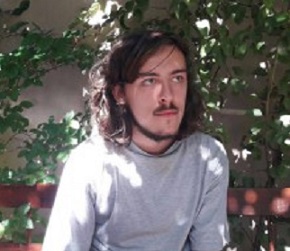
Jordi Lammers (Venray, 1996)
De Duitse schrijver en advocaat Ferdinand von Schirach werd geboren in 1964 in München. Zie ook alle tags voor Ferdinand von Schirach op dit blog.
Uit: Strafe
„Katharina wuchs im Hochschwarzwald auf. Elf Bauernhöfe auf 1100 Meter Höhe, eine Kapelle, ein Lebensmittelgeschäft, das nur montags geöffnet hatte. Sie wohnten im letzten Gebäude, einem dreistöckigen Hof mit heruntergezogenem Dach. Es war das Elternhaus ihrer Mutter. Hinter dem Hof war der Wald und dahinter waren die Felsen und dahinter war wieder der Wald. Sie war das einzige Kind im Dorf. Der Vater war Prokurist einer Papierfabrik, die Mutter Lehrerin. Beide arbeiteten unten in der Stadt. Katharina ging nach der Schule oft zur Firma des Vaters, sie war damals elf Jahre alt. Sie saß im Büro, wenn er über Preise, Rabatte und Liefertermine verhandelte, sie hörte bei seinen Telefonaten zu, er erklärte ihr alles so lange, bis sie es verstand. In den Ferien nahm er sie mit auf Geschäftsreisen, sie packte seine Koffer, legte seine Anzüge raus und wartete im Hotel, bis er von den Terminen zurückkam. Mit dreizehn war sie einen halben Kopf größer als er, sie war sehr schmal, ihre Haut hell, ihre Haare fast schwarz. Ihr Vater nannte sie Schneewittchen, er lachte, wenn jemand sagte, er habe eine sehr junge Frau geheiratet. Zwei Wochen nach Katharinas vierzehntem Geburtstag schneite es das erste Mal in diesem Jahr. Es war sehr hell und sehr kalt. Vor dem Haus lagen die neuen Holzschindeln, der Vater wollte das Dach noch vor dem Winter ausbessern. Wie jeden Morgen fuhr sie mit der Mutter zur Schule. Vor ihnen war ein Lastwagen. Die Mutter hatte den ganzen Morgen nicht gesprochen. »Dein Vater hat sich in eine andere Frau verliebt«, sagte sie jetzt. Auf den Bäumen lag Schnee und auf den Felsen lag Schnee. Sie überholten den Lastwagen, auf der Seite stand »Südfrüchte«, jeder Buchstabe in einer anderen Farbe. »In seine Sekretärin«, sagte die Mutter. Sie fuhr zu schnell. Katharina kannte die Sekretärin, sie war immer freundlich gewesen. Der Vater hatte ihr nichts gesagt, nur daran konnte sie noch denken. Sie drückte ihre Fingernägel in die Schultasche, bis es weh tat. Der Vater zog in ein Haus in der Stadt. Katharina sah ihn nicht mehr.
Ein halbes Jahr später wurden Bretter vor die Fenster des Hofs genagelt, das Wasser wurde aus den Rohren gelassen und der Strom abgestellt. Die Mutter und Katharina zogen nach Bonn, dort lebten Verwandte. Katharina brauchte ein Jahr, um sich den Dialekt abzugewöhnen. Für die Schülerzeitung schrieb sie politische Aufsätze. Als sie sechzehn war, druckte eine lokale Tageszeitung ihren ersten Text. Sie beobachtete sich bei allem, was sie tat.“
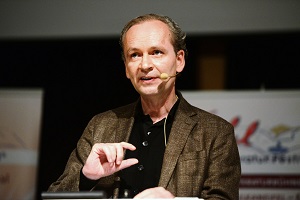
Ferdinand von Schirach (München, 1964)
Zie voor nog meer schrijvers van de 20e november ook mijn blog van 20 november 2017.

